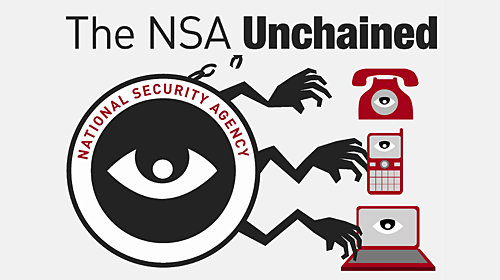
This column was originally published on MSNBC.com.
Over the course of three days, the usually invisible National Security Agency has become ostentatiously visible and many Americans do not like what they see. In an effort to address the widely shared feeling that our vaunted system of checks and balances has utterly failed us, President Obama reassured the public Friday that the now-exposed spy programs were sanctioned by "all three branches of government." Is that true?
Yes and no.
There's no question, of course, that the executive branch backed the programs. In fact, both President George W. Bush and President Obama enthusiastically embraced the surveillance authorities that were used to justify them. Bush lobbied Congress to enact the USA Patriot Act in 2001 and the FISA Amendments Act in 2008. Obama urged Congress to reauthorize both of these statutes.
And Congress did enact these statutes and then reauthorize them, so it certainly deserves a great deal of the blame for the massive privacy intrusions that were disclosed this past week. But, as we were reminded when several members of Congress came forward to say that they had been unaware that the NSA was using the Patriot Act to collect phone data from millions of Americans, it can be very difficult for Congress to conduct oversight of top secret, highly compartmentalized intelligence programs. In fact, it seems certain that many members of Congress voted to reauthorize the Patriot Act provision at issue here—Section 215—without even knowing what they were authorizing.
What about the courts? It's true that a specialized intelligence court issued the orders approving the NSA's seizure of Americans' phone records—but the FISA court is no ordinary court. It meets in secret, allows only the government to appear before it, and rarely publishes its decisions. When the American Civil Liberties Union attempted to challenge the NSA's surveillance authority in ordinary federal court, the government succeeded in having the case dismissed on the grounds that we couldn't prove that our plaintiffs had been subjected to surveillance—because, of course, that surveillance is top secret.
So at best, judicial review has amounted to a secret court upholding a secret program by secretly re-interpreting a federal law. That's hardly the kind of firm endorsement by "all three branches" that the president's comments suggested.
And if we're asking whether our system of checks and balances is actually working, we should ask not only about oversight conducted by Congress and the judiciary but also about oversight conducted by the public. Can anyone seriously suggest that the public ever had an opportunity to evaluate the wisdom, necessity, or legality of the programs that were disclosed this past week? In his comments Friday, Obama said that he "welcomes" a debate about the proper limits on government surveillance. We welcome that debate, too. But why are we having this debate only now? Why was all of this secret for so long?
The surveillance information revealed this week did not disclose any operational details that would aid our enemies—there was no conceivable justification for keeping the American people in the dark until now. We should have had this debate before Congress authorized these sweeping powers, and certainly before the executive branch implausibly interpreted them to permit dragnet surveillance of Americans' communications.
It is probably safe to assume that the NSA is engaged in other surveillance that has implications for Americans' constitutional rights. The ACLU is currently fighting a Freedom of Information Act lawsuit to learn more about the government's interpretation of Section 215, but so far the Obama administration has refused to say anything about what kinds of spying it believes the provision permits. If Obama genuinely welcomes a debate over surveillance authorities, will his administration declassify enough information to permit an informed public debate, or will we have to wait for the next leak?
This past week's disclosures show that we need stricter limits on government surveillance, and stronger oversight mechanisms to ensure that those limits are honored. The suggestion that our system of checks and balances is working is wrong.
Learn more about FISA and other civil liberty issues: Sign up for breaking news alerts, follow us on Twitter, and like us on Facebook.


